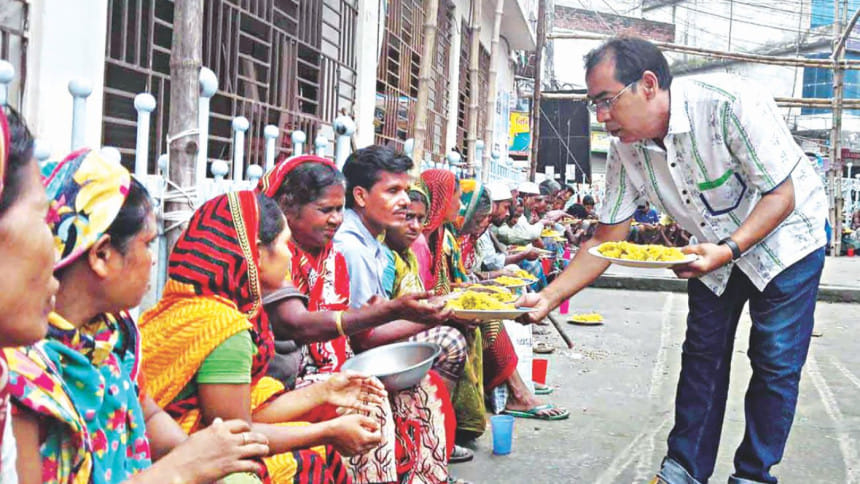Free food for the poor

What to have for dinner? It's a question that for many is a matter of basic choice. But for those of us not blessed with a reliable income, finding a meal can be more challenging. Every day some people won't manage; some will go hungry. It is an enduring, sad reality that is true of almost everywhere; a reality that Tangail restaurateur Mirza Masud Rubol refuses to accept.
“I read about a free restaurant for the poor in Madrid, Spain,” says Masud, who is also the general secretary of Tangail's restaurant and sweetshop owner's association. “I was inspired to do something here. As it was, distressed people often came to my restaurant in search of food and I had to give them. I wanted to provide for everybody.”
Earlier this year he set up a free street kitchen run at the Shaheed Minar premises every evening. The menu was good: steaming rice with fish, meat or egg curry, chicken hotchpotch or that delectable dish prepared with fish or goat head called murigantha. There were time-to-time treats such as mango milk, too. With up to 160 guests dining each evening, for perhaps the first time in Tangail's history, none went hungry.
“Anyone could take a meal, there was no bar,” recalls Manik Hossain, the manager of Masud's eatery who prepared the food. “Nobody left with an empty stomach.”
The initiative was popular. Ahammad, 12, from Mohiskhola area in the town pulls a rickshaw van at the local fish market. He was a regular patron. “I spend around Tk 40 for my supper,” he says, “I was able to save that.”
Maznu Miah, Shukur Ali and Abu Miah, all over 50 years old, normally sleep at the rifle club premises after a day of begging. They too were regular street kitchen diners. “I usually eat stale food,” says Maznu, “whatever people give when I beg. At the street kitchen I ate hot rice with tasty curry!”
Tania, 30, who lives a precarious life at Shantikunjer Corner in the town, used to bring her young daughter with her to enjoy the evening meal. “We ate there every day,” she says, “I don't know who fed us.”
The street kitchen required at least 25 kilograms of rice and cost around Tk 3,000 per day to run, relying on the services of twelve staff, six of whom were waiters from Masud's restaurant, with the remaining six being street hawker and rickshaw driver volunteers.
“I was really happy to volunteer,” says Shahida Begum, 40, who runs a teashop on the footpath of Victoria Road. “And I also took my dinner there.”
“It gave me a new kind of mental peace to help out,” says another volunteer, rickshaw driver Shahin Miah from Dighulia area of the town. “With my rickshaw kept to one side I served our guests willingly.”
Naturally the street kitchen initiative did not go unnoticed. “Even if somebody arrived in Tangail town with an empty pocket they did not go hungry,” recalls one resident, Jakir Hossain. “It was a really noble initiative. May God bless Masud Bhai!”
Unfortunately however, the cost of feeding so many people every day proved burdensome on Masud's personal finances. While some of his friends did donate extra items like milk or mangoes on an ad hoc basis, none stepped forward to contribute regularly. Now the street kitchen operates only on a Friday afternoon.
“I spent my meagre savings to keep the daily kitchen running for as long as possible,” says Masud. “What else could I do? I'd like to run it every day like before but I need to find a way. If only I had 30 kilograms of rice per day, I could arrange the rest.”
He approached the upazila food officer in Tangail to see if rice could be made available, to no avail. Masud is not sure where else to turn.
“Many people in this town have lots of money and the ability to help,” says one town-dweller Shafiqul Islam Jewel. “Perhaps Masud Bhai alone has the heart.”
“Despite a lot of wealthy traders and politicians, along with government and non-government organisations being based in Tangail, Masud's daily initiative to feed the destitute couldn't continue,” says development worker Bidyut Khoshnobish. “That is our community's shame.”

 For all latest news, follow The Daily Star's Google News channel.
For all latest news, follow The Daily Star's Google News channel. 



Comments